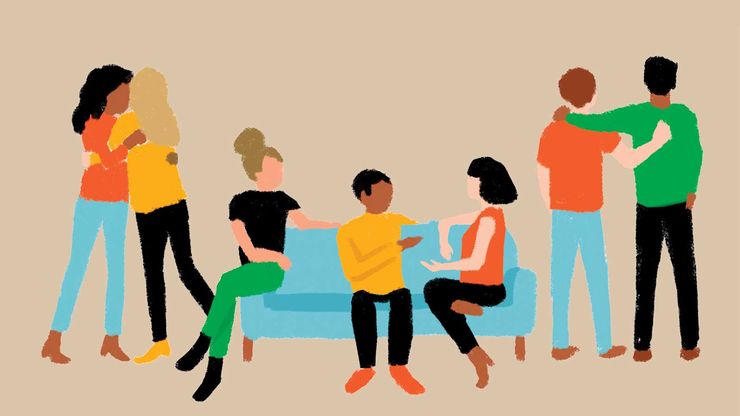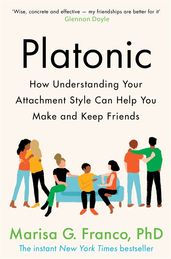How to make friends as an adult
'In adulthood, you can’t rely on friendship to happen organically': psychologist Marisa G. Franco offers practical tips on how to meet people and make new friends.

Making new friends can be really difficult. Whether you've moved to a new place, feel a bit shy, or are just really busy, it can be hard to know where to start. Weaving together cutting-edge research in psychology with interviews, personal stories and practical advice, Marisa G. Franco's book Platonic gives us the tools we need to be better friends, and better humans. Here she gives us some practical ideas to help make new friends as an adult.
As a friendship expert, the most frequently asked questions I get is how do you make friends as an adult? When we’re kids, friendship may come easy because in childhood, we inhabit environments that expose us to the ingredients sociologist Rebecca G. Adams considers necessary for friendship to occur: proximity, vulnerability, and repeated, unplanned, interactions. We access these ingredients at school break times, lunch, P.E. lessons or through extracurricular activities and clubs. Yet, as adults, many of us don’t inhabit any environments that provide us with these ingredients. We may see people repeatedly through work, but we’re rarely truly vulnerable there.
In adulthood, you can’t rely on friendship to happen organically, like it may have when you were younger. Here are some practical tips to help you make friends.
Assume people like you
Most people don’t initiate friendships because they’re afraid of rejection. However, research finds that we’re less likely to be rejected than we think. When strangers interacted and predicted how liked they were by the other, they underestimated how much they were liked.
So instead of assuming people will reject you, assume they’ll like you instead. When we think we’ll be rejected, we tend to be closed off and withdrawn, making us more likely to be rejected because we’re coming off as rejecting. Research shows, however, that when people are told they’ll be liked they become friendlier, warmer, and more open; this assumption becomes a self-fulfilling prophecy.
Take initiative
To make new or more friends we have to relinquish the myth that friendship happens organically. One study found that the more people thought friendship happened without effort, the lonelier they were five years later. Those who thought making friends required effort were less lonely. Why? They made the effort, showing up at places of worship or volunteering to meet people.
‘Embracing the importance of initiating means that we have to take responsibility for making new friends and not just wait passively for others to approach us.’
Embracing the importance of initiating means that we have to take responsibility for making new friends and not just wait passively for others to approach us. We can find someone we like and say “It’s been so nice to connect with you. Would you be open to exchanging contact information?”
Enlist in a repeated social event
The more we see people, the more we like them. This is a phenomenon called the mere exposure effect. A study illuminating this concept involved planting women into a psychology lecture. At the end of the semester, the students in the lecture didn’t remember any of the women, but they reported liking the woman who showed up to the most classes 20% more than the woman who didn’t show up to any.
How can we harness mere exposure? Often when we want to make friends, we may attend a single event, such as a happy hour or a lecture, to make friends. But, instead, we should participate in something that repeats over time. Instead of going to a happy hour, join a professional development board. Instead of joining a Spanish language workshop, join a Spanish language course.
Overcome covert avoidance
You found your social event to commit to. Great! That means you’ve overcome something called overt avoidance, which occurs when we avoid people because they make us nervous. But you also have to overcome covert avoidance, which occurs when we show up physically to a social event but disengage mentally. We might be on our phone the whole time, or talking to the one person we already know.
Overcoming covert avoidance looks like approaching someone in your Spanish class and saying “Hi. How are you enjoying this course so far?” Even better, we can repot the friendship, a concept coined by Ryan Hubbard, founder of the Kitestring project, to describe the ways our friendships deepen when we vary the setting in which we interact. This might look like saying “Do you want to get dinner after Spanish class next week?”
‘I used to think that people wanted to be friends with someone perfect, so I wouldn’t be vulnerable. But since then, I’ve come across research finding that the more intimately we disclose, the more liked we are.’
Get vulnerable
I used to think that people wanted to be friends with someone perfect, so I wouldn’t be vulnerable. But since then, I’ve come across research finding that the more intimately we disclose, the more liked we are. Another study found that closeness could be reliably created in a laboratory when research participants answered increasingly intimate questions about themselves.
So next time you meet up with a friend, tell them how you’re really doing. Share a thought you had today that you’d typically keep to yourself. Ask them more intimate questions, things like: When was the last time you felt great joy? What are ways you’re looking to grow?
Putting it all together
Making friends as an adult is challenging, but not impossible. And the research suggests it’s not as hard as we think. Inviting people over, joining a group that meets repeatedly, or getting vulnerable are strategies that can reliably make us friends. As my niece said when she read my book on making friends, Platonic, for friendship to happen, someone has to be brave. Be brave.
Platonic
by Marisa G. Franco, PhD
When was the last time you put yourself out there to make a new friend? For many of us, the answer is too long ago. In Platonic, Dr Marisa G. Franco explains how the undervaluing of friendship in our culture has led to an epidemic of isolation, and what we can do about it. Platonic teaches us to identify and understand our individual attachment styles and why exploring how we behave in relationships is the key to unlocking what we’re doing right (and what we could do better) in our friendships. This book is the ultimate guide to learning how we make and keep friends for life.



